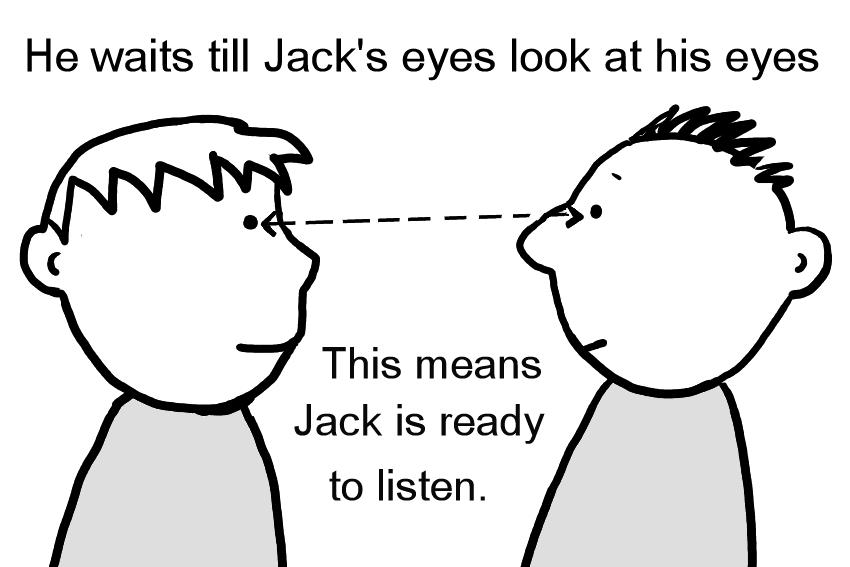Someone has asked me about head movements.. for the second time! None of us in TISA are SLPs, Psychologist or Brain scientists- but yes, we can do a little research and offer some evidence based insights.
Let me at the outset, say that head movements do have a place in body language and can be used to strengthen our communication (link). But can they help recovery from stammering? in the long run?
I think those of you, who have used finger tapping, will realize that conscious head movements probably serve the same purpose and may help, to a limited extent- just like finger tapping. Most pws stop finger tapping after a few months. It does not go to the root of the problem. It is a distracting device.
But the real issue during a block or speech difficulty, for most of us is: averted eyes, lowered gaze, blinking, even complete closing of eyes. The problem for the listener is- looking at our broken eye contact, s/he may think that we are ashamed/ frightened/ guilty/ unsure/ hiding something etc. When eye contact is lost, the communication link is broken. The same can not be said about the head movements. Here check this little paper form a SLP on this very subject (link). (More on eye contact and its central role in communication.)
Secondly,how many instructions can a pws actually remember? 1,2 or 4? If we ask him to remember too many things while talking, will he remember what he wanted to say in the first place?!
So, we need to prioritize. And eye contact easily tops this small list of recommendations. If a pws can maintain good eye contact – even when, rather, especially when he is stammering- it needs some practice and will power to do so – but if s/he can do that, chances are s/he will stammer much less, communicate better, feel relaxed and AUTOMATICALLY use his natural head movements, hand gestures, and other body language skills. When we are relaxed, we are our natural self and use our body language to support what we are saying verbally (congruence) – without being taught. When you are relaxed, you smile spontaneously- dont you? OR do you consciously make an effort?
So, how do we, the pws, learn to relax in speaking situations? Van Riper and Sheehan (and others) talk about desensitization repeatedly. The four core techniques, promoted by TISA (not invented by TISA- but documented by Dr Peter Reitzes and others) achieve that goal to a great extent. These techniques may appear “physical techniques” to untrained eyes but they act where the problem lies- our speech- PLUS at the level of our mind, our emotions, where lie 90% of our iceberg.
For example- when you walk in a shop and bounce, you are saying to yourself: I am being dis-fluent, so what? Who cares? Similarly, when you pause in a sentence for 10 seconds, you are steeling yourself, to “time pressure”. Voluntary stuttering puts you in touch with your deepest fears and helps you to work on them systematically and surely. Only when you practice them (in SHG or in an online SHG setting), you get to know these deeper truths about these highly respected and tested techniques, which are in public domain and free. Read more about it on Internet or in Apna Hath Jagannath.
But, yes there are many more things which can help in a peripheral way: Chanting Gayatri mantra, practising martial arts or changing jobs – can help someone. But, at TISA, we dont promote them as core techniques, because these are highly individualistic experiences. They may or may not work for 8 out of ten people. Similarly, “what worked for me, must work for others too” is an approach, we try to avoid. There are enough objective, evidence based approaches, which go to the heart of the matter- for all of us, easily available for free, in public domain.
Last, if you are benefiting by head movements or anything else- just dont worry, carry on with it!! You are the best judge for what works for you.
————————————————
More about Peter Reitzes. The four techniques are- Bouncing, Prolongation, Pausing, Voluntary stammering. Come to NC, for a crash course on these four and many more!! Learn more about body language here. There is a great book by Allan Pease- see if you can find it..”the definitive book of Body language”..



 As we earlier decided meeting time at 09:30 AM...
As we earlier decided meeting time at 09:30 AM...
1 thought on “Body Language..”
admin
(July 4, 2014 - 7:53 pm)I will reserve my comments on this article till January 2015, as substantial number of whatsapp members were giving positive feedback about their speech improvement by practicing speech therapy with head movements.
Let us see the results after actual practicing by the whatsapp members in January 2015 and come to a conclusion .
Comments are closed.